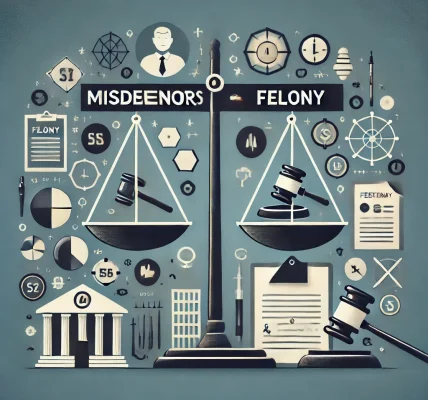Introduction
Being falsely accused of a crime is a distressing and life-altering experience. A false accusation can damage your reputation, relationships, career, and even lead to legal consequences. If you find yourself in this situation, it is crucial to remain calm, understand your legal rights, and take the right steps to protect yourself.
This guide will walk you through what to do if you are falsely accused of a crime, ensuring that you handle the situation effectively and legally.
1. Stay Calm and Do Not Panic
The first and most important thing to do is stay calm. Reacting emotionally or aggressively can worsen the situation. A false accusation is serious, but by handling it wisely, you can prevent unnecessary legal trouble.
- Avoid arguing with the accuser.
- Do not attempt to confront or threaten anyone involved.
- Stay composed and start preparing your defense.
2. Do Not Speak to the Police Without a Lawyer
Many people believe that they should explain their side of the story immediately to the police. However, this can be a mistake. Anything you say can be used against you, even if you are innocent.
- Politely refuse to answer any questions without a lawyer present.
- If approached by law enforcement, state: “I would like to remain silent and speak to my attorney.”
- Do not sign any documents or agree to anything without legal counsel.
3. Hire a Criminal Defense Lawyer Immediately
A criminal defense lawyer is your best ally when facing false accusations. A qualified attorney will:
- Protect your legal rights.
- Guide you through the legal process.
- Help you gather evidence to prove your innocence.
- Communicate with law enforcement and prosecutors on your behalf.
Even if you believe the truth will come out on its own, never face false accusations without an attorney.
4. Gather and Preserve Evidence
To prove your innocence, you need solid evidence. Start collecting any relevant documents, records, or witness testimonies that can support your case.
- Alibi Evidence: If you were somewhere else when the alleged crime occurred, collect receipts, GPS data, surveillance footage, or witness statements.
- Text Messages and Emails: Keep any communication with the accuser or others involved.
- Phone Records: Call logs can prove your location and interactions.
- Social Media Posts: If relevant, collect screenshots of posts, messages, or comments.
The sooner you collect evidence, the stronger your defense will be.
5. Identify Witnesses Who Can Support Your Case
If someone can confirm your whereabouts or provide information that disproves the allegations, get their statements as soon as possible.
- Witnesses can include family members, colleagues, friends, or surveillance footage operators.
- Your attorney can help interview and document witness testimonies properly.
6. Avoid Contact with the Accuser
While you may want to confront the accuser to clear your name, do not do this. Contacting them could be seen as harassment, intimidation, or obstruction of justice.
- Let your lawyer handle all communication.
- Avoid talking about the case on social media.
- Maintain distance to avoid misunderstandings.
7. Be Careful with Your Public and Online Presence
In today’s digital world, anything you post online can be used in court.
- Do not discuss your case publicly.
- Avoid making emotional or defensive posts.
- Set your social media accounts to private.
- Inform friends and family to refrain from discussing the case online.
8. Cooperate with Legal Proceedings, But Follow Your Lawyer’s Advice
While it is essential to comply with any legal requests, always consult with your attorney before taking any actions, such as:
- Attending hearings.
- Giving statements.
- Providing documents or records.
Your lawyer will ensure that your cooperation does not unintentionally harm your defense.
9. File a Counterclaim or Defamation Lawsuit (If Applicable)
If the false accusation has caused significant harm to your reputation, career, or emotional well-being, you may have the right to take legal action against the accuser.
- Defamation Lawsuit: If someone falsely accused you publicly, you can sue for defamation (libel or slander).
- False Police Report: If the accuser knowingly filed a false police report, legal action may be taken against them.
- Malicious Prosecution: If the accuser acted with bad intent, you may be able to seek damages.
Consult your attorney to see if you have grounds for a counterclaim.
10. Prepare for Possible Trial or Settlement
If charges are filed, your case may go to trial. In this situation:
- Work closely with your lawyer to prepare your defense.
- Review all evidence and possible arguments against you.
- Stay patient, as legal proceedings can take time.
In some cases, the prosecution may drop charges if there is insufficient evidence. In others, a settlement or plea agreement may be offered. Your lawyer will help you make the best decision for your situation.
Conclusion
Being falsely accused of a crime is a stressful experience, but by taking the right steps, you can protect yourself and your reputation. The key takeaways are:
- Stay calm and avoid emotional reactions.
- Do not speak to the police without a lawyer.
- Hire a criminal defense attorney immediately.
- Gather strong evidence and find reliable witnesses.
- Avoid contact with the accuser and be cautious online.
- Cooperate with legal proceedings but follow your lawyer’s advice.
- Consider legal action if the false accusation has caused significant harm.




